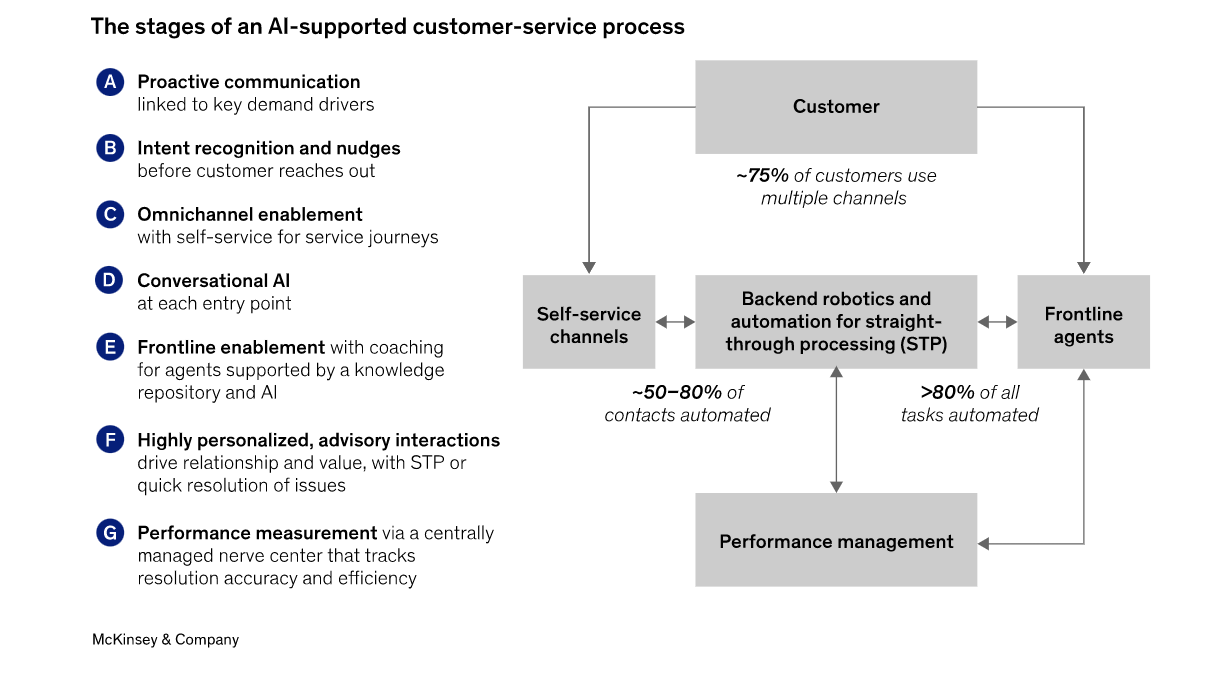For quite some time, conversational AI has been the talk of the town. Still, businesses have been facing a slew of challenges, including natural language understanding limitations, handling complex and unique scenarios, emotional intelligence, and misinterpretations.
With the introduction of generative AI and its human-like sophisticated technology, the customer service ecosystem has received an encouraging shot of adrenaline to continue down the path of AI adjustments. According to a study, human support agents reported resolving more customer queries per hour when aided by a custom-built tool powered by generative AI.
Modern AI solutions, powered by natural language, machine learning, and reinforcement learning, can now understand the subtleties of human conversation, such as tone, inflection, and context, ensuring seamless interactions. It allows customer service teams and contact centre models to enhance request routing, sentiment analysis, agent analytics, interoperability, app integrations, and customer journey orchestration.
Several technologies will work in tandem to fuel the massive advancement of AI in customer service. For instance, the progress of Deep Learning technology will enable AI systems to process complex and unstructured data, including images, audio, and video. It will be instrumental in developing more intelligent facial recognition software, voice assistants, and visual search for better customer service experiences.
Further unravelling of NLP technology will be fruitful in understanding and interpreting human language in all forms. From speech recognition and sentiment analysis to language translation, NLP will help advance AI-driven bots and assistants to understand customer queries and emotions better. And this is just the tip of the iceberg.
Fuelling the future of CS, technology companies are already knee-deep into working on impressive AI solutions to deliver more personalised, efficient, and satisfying experiences. As AI technology continues to advance, the potential of taking your customer service to greater heights through AI is limitless.
For instance, consider Sprinklr’s AI-powered guided workflows. Think of it as the trusty co-pilot for customer service agents, guiding them through the turbulent skies of complex customer inquiries. With the increasing power of AI, these workflows will be able to understand customer intent better and provide a wealth of knowledge at agents’ fingertips.
Sprinklr recently added 120 new CCaaS features and 25 new AI features for the Sprinklr Service product suite, including predictive intelligence, AI-powered quality management, impact analysis, top contact driver, and outbound voice.
Amazon has updated features on Chime SDK, a call analytics tool that can analyse customers’ tones to evaluate sentiment. Cisco incorporated AI into Webex Connect, its cloud communications and contact centre offering. The latest upgrades will allow CS teams to automate personalisation and use ML to incorporate self-learning.
AI will bring a paradigm shift in the customer service landscape, and the future is not far away. But here’s a word of caution: In order to make AI the face of customer service, developers have a long road ahead of them. Without room for personalisation and empathy, bias-free intelligence, AI can only be limited to back-end coding, automation and more minor inquiry-led services. Until then, the human agents will have to continue being the world’s Atticus Finchs’, Fred Rogers’ and Betty Whites — all known for their empathy and kindness.












































































































